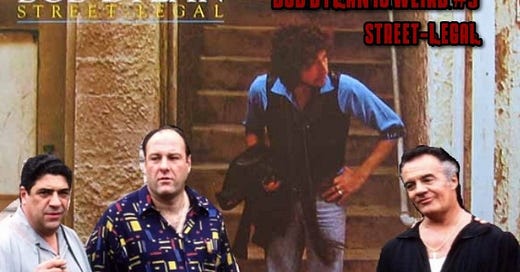Street-Legal is the end of the road. Look at Bob Dylan standing there, waiting to be rescued from permanent career decline. It’s been called his Springsteen album, full of sleazy horns and bluesy rock songs. It feels both under and overwritten. Which speaks to druggy indulgences - falling in love with bad ideas while choking the breath from the good ones. Why did Bob Dylan go religious in the late 70s? The answer is in this album.
You have to be a big Dylan fan to be into Street-Legal, even then with a good many asterisks. The mix is notoriously muddy, thanks to a full band recorded live to tape. The big Vegas gospel arrangements clash with the post-divorce heartbreak songs. You can hear out of tune guitars (“We Better Talk This Over”) in the cacophony. Backup singers repeat the lyrics, no matter how absurd.
Clearly Dylan was troubled in 1978, with personal issues as he was losing the career grip. “Changing Of The Guards” speaks to this. Underneath the imagery of palace intrigue is the story of his life in the music business. It’s just buried under lots of weird stuff - renegade priests, mirrors of dog soldiers, maids with shaved heads - without a care for clarity. But listen closely and you’ll hear the story of his muse, his followers, and his odd existence in the center of a singular sort of fame.
It’s all very contradictory, like a yin yang symbol hanging from the neck of a rock star. After his divorce in 1977 he poured his spirit into Renaldo & Clara, a tour film/experimental travelogue that totally bombed. Critics were confused and fans ignored it. C’mon Bob, Star Wars is out. He took his Vegas-y band on a world tour, stumbling into self-parody with a live album Bob Dylan At Budokan that presented his classics as showtunes.
Nor was Street-Legal well received. The Dylan intelligentsia couldn’t decide if it was a joke or a fraud. Greil Marcus’s review veers toward character assassination, extrapolating the dumber lyrics as evidence of misogyny. It’s certainly fair to hold rock musicians to standards we’re all striving for, to not just accept sexist tropes. As well to expect even more from Dylan. But also - critics giveth, and take away. A few years later Sonic Youth would feud with Village Voice critic Robert Christgau with a song pointedly titled “Kill Yr Idols.” Such revolution was in the air.
In hindsight those contemporary takes seem off. The overall quality of this album is its eeriness, with some pure unvarnished emotions, and lots of tragedy buffered by the buzz of lust and probably drugs. Sometimes it hits - like “Señor (Tales of Yankee Power)” with its narrative of a soldier following dutifully toward death, or the dark visionary heartbreak of “True Love Tends To Forget.” But then there’s the raunchy blues “New Pony” with lyrics on the level of Andrew Dice Clay’s limericks. Or “No Time To Think” with tedious verses that prove the point of its title refrain. We can hear him trying to write his way out of a corner, and failing. Recalling his own words - “I just can’t do what I done before.”
The key is the final song, “Where Are You Tonight? (Journey Through Dark Heat).” Structurally it recalls “Like A Rolling Stone,” but this one is more like a cry from rock bottom. The lyrics allude to dead end debauchery (“Horseplay and disease is killing me by degrees/ While the law looks the other way…Your partners in crime hit me up for nickels and dimes/ The man you were loving could never get clean”). Which ends in lonely desperation, with all the bills coming due, spiritually and otherwise.
Writers write to understand their world. Worse even than writer’s block is when the results are wonky, and so lead to more confusion. This is the conundrum suggested by Street-Legal. In a way it’s the last Bob Dylan album of the original rock poet version, before it got washed clean with religion and emerged in the ‘80s as a proper Legend, no longer vital but at least deserving of respect. It’s a weird and confused album, and I love it despite its faults. For those times when we’re as befuddled as him on the cover, standing still when everything has changed, when as Jay-Z said, “It was all good just a week ago.”





